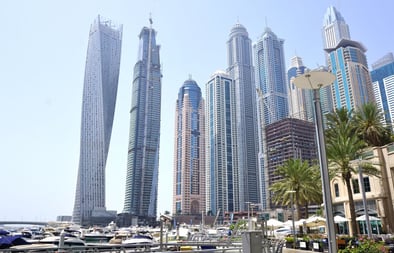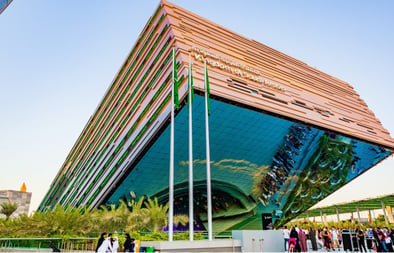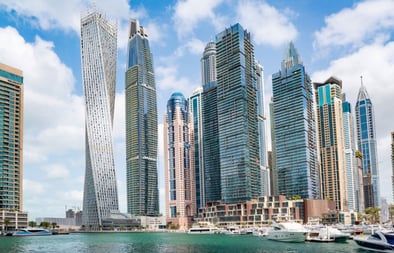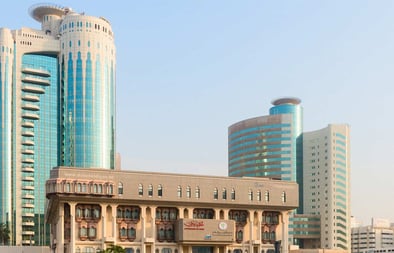
Real estate investing is a highly lucrative and rewarding investment avenue that offers substantial returns when approached strategically. Investors around the world have found success in various real estate markets, and one notable example is the thriving real estate market in Dubai. The city’s real estate market has gained global recognition for its rapid growth and exceptional investment opportunities. It’s strategic location, robust infrastructure, economic stability, and visionary development initiatives have attracted both local and international investors. Dubai's real estate sector offers a diverse range of investment options, from luxurious residential properties and commercial developments to iconic landmarks and hospitality projects.
Investors in Dubai's real estate market have benefited from the city's consistent economic growth, increasing tourism, and a favorable regulatory framework that protects property rights. The market has demonstrated resilience, even during challenging economic times, making it an attractive destination for investors seeking long-term returns.
In this comprehensive guide, we will explore various strategies for maximizing returns in real estate investing, drawing insights from successful investments in Dubai's dynamic market. By examining these strategies and analyzing the unique characteristics of real estate in Dubai, investors can gain valuable insights to inform their own investment decisions. Whether it's capitalizing on the city's growing rental market, identifying undervalued properties poised for appreciation, or leveraging innovative investment vehicles like REITs, understanding the nuances of Dubai's real estate market can pave the way for significant returns.
Through detailed exploration of each strategy and the provision of real-world examples, this guide aims to equip investors with the knowledge and tools necessary to make informed investment decisions in Dubai's real estate market. By applying these strategies and adapting them to their specific investment goals, investors can unlock the potential for substantial returns and build a successful real estate portfolio in this vibrant and dynamic city.
1. Buy Low, Sell High
One of the fundamental principles of real estate investing is buying properties at a low price and selling them at a higher price, thereby capturing the appreciation in value. To identify undervalued properties, thorough research and market analysis are crucial. Consider factors such as local market trends, economic growth, and development plans for the area.
For example, imagine you find a property in an up-and-coming neighborhood where new infrastructure projects and amenities are being developed. You discover that similar properties in the area have appreciated significantly over the past few years. By purchasing this property at a discounted price before the full potential of the neighborhood is realized, you can benefit from substantial returns when selling it in the future.
Additionally, properties that have been on the market for an extended period often present opportunities for negotiation and potential discounts. By leveraging these circumstances, you can acquire properties below their market value, positioning yourself for higher returns.
2. Generate Income Through Rental Properties
Investing in rental properties is an excellent way to generate consistent cash flow and maximize returns. Rental income provides a stable source of revenue that can offset the costs of owning the property and contribute to long-term profitability.
For instance, suppose you invest in a residential property located in a high-demand rental market. After conducting thorough market research, you determine the optimal rental price for the property. By carefully screening tenants and maintaining the property's condition, you can ensure a steady rental income stream. Over time, as property values appreciate, you may also benefit from increased equity in the property, further enhancing your overall returns.
3. Utilize Leverage
Real estate investing often requires significant capital, which may be beyond the means of many investors. Leveraging allows investors to utilize borrowed funds to finance their property acquisitions, enabling them to invest in multiple properties and potentially amplify their returns.
Consider a scenario where you have $100,000 available for investment. Instead of purchasing a single property outright, you decide to utilize leverage by obtaining a mortgage and investing in multiple properties with a combined value of $500,000. Over time, as the properties appreciate in value, the returns on your initial $100,000 investment are amplified across the entire portfolio. However, it is important to exercise caution and evaluate the risks associated with borrowing and interest rates, ensuring that your rental income can cover any financing costs.
4. Invest in REITs
Real Estate Investment Trusts (REITs) offer an alternative way to invest in real estate without directly owning and managing properties. REITs are companies that own, operate, or finance income-generating real estate. By investing in REITs, you can diversify your real estate portfolio, benefit from professional management, and enjoy regular dividend payments.
For example, suppose you are interested in investing in commercial real estate but lack the expertise or capital to own and manage properties directly. By investing in a Commercial REIT, you can gain exposure to a diverse portfolio of office buildings, retail centers, or industrial properties. The REIT's professional management team handles tenant leasing, property maintenance, and rent collection, while you receive a portion of the income generated by the portfolio.
It is important to conduct thorough research and assess the performance, track record, and dividend history of different REITs before making investment decisions. Additionally, consider the specific type of REIT that aligns with your investment goals, such as Equity REITs, which focus on owning and managing income-generating properties, or Mortgage REITs, which invest in real estate debt instruments.
5. Add Value to Existing Properties
Adding value to existing properties is a strategy that involves identifying properties with unrealized potential and making improvements to enhance their market value. By making strategic renovations or upgrades, investors can increase rental income, attract higher-paying tenants, or command a higher selling price in the future.
Suppose you acquire a residential property in need of cosmetic updates. By renovating the kitchen, bathrooms, and improving the overall aesthetic appeal, you can significantly enhance the property's desirability and rental potential. Consequently, you may be able to charge higher rental rates and attract quality tenants, ultimately increasing your cash flow and potential returns.
In another example, imagine purchasing an underutilized commercial property with ample space for additional units. By obtaining the necessary permits and transforming the property to accommodate more tenants, you can increase rental income and maximize the property's overall value. This strategy is commonly employed in multi-unit apartment buildings or commercial complexes.
In conclusion, Dubai's real estate market has distinguished itself on a global scale, attracting investors with its consistent economic growth, increasing tourism, and a favorable regulatory framework. The city's strategic location and visionary development initiatives have contributed to its reputation as a sought-after destination for real estate investments. Investors in Dubai have witnessed the market's resilience, even during challenging economic times, making it an attractive option for those seeking long-term returns. By understanding the nuances of Dubai's real estate market, investors can apply the strategies discussed in this guide to capitalize on the city's unique opportunities. Whether it is identifying undervalued properties, generating income through rental properties, utilizing leverage, investing in REITs, or adding value to existing properties, each strategy has the potential to maximize returns in Dubai's dynamic market.
It is essential for investors to conduct thorough research, assess market trends, and carefully evaluate each investment opportunity. Dubai's real estate market offers a diverse range of options, from residential and commercial properties to iconic landmarks and hospitality projects. By aligning investment strategies with specific market conditions and investment goals, investors can unlock the potential for substantial returns and build successful real estate portfolios in this vibrant and dynamic city.



























.jpg)

































































































